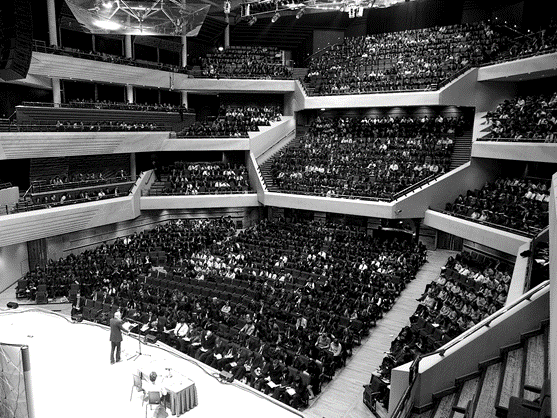

 On Friday 24th November, a group of 50 Year 11 students went to the GCSE English Poetry Live Conference at the Dominion Theatre. In attendance were approximately two thousand students from various schools. There were a variety of poets from the GCSE poetry anthology, along with a Chief Examiner and another poet, Daljit Nagra, whose poems were not in our anthology, but have been previously taught at GCSE. If you are in Year 11, look out for top tips from your teachers in relation to your GCSE poetry exam - you’ll get these in revision lessons this term in the run up to the mocks, and again nearer the summer.
On Friday 24th November, a group of 50 Year 11 students went to the GCSE English Poetry Live Conference at the Dominion Theatre. In attendance were approximately two thousand students from various schools. There were a variety of poets from the GCSE poetry anthology, along with a Chief Examiner and another poet, Daljit Nagra, whose poems were not in our anthology, but have been previously taught at GCSE. If you are in Year 11, look out for top tips from your teachers in relation to your GCSE poetry exam - you’ll get these in revision lessons this term in the run up to the mocks, and again nearer the summer.
Here’s what a few Year 11s had to say about the event:
John Agard, who wrote ‘Checking Out Me History’ and ‘Half-Caste’, was my favourite out of all the poets, as he was very entertaining and enthusiastic whilst reading his poems. Overall, it was an amazing trip and I would definitely go again, given the opportunity.
Gracie Gosling, Year 11
 Simon Armitage, a poetic luminary, captivated the audience with his eloquence and profound insight. His presence exuded a quiet confidence, and as he spoke, his words carried the weight of experience and poetic mastery. Armitage's ability to seamlessly blend everyday language with poetic nuance left an indelible impression. The room hung on his every word, as he shared not just poetry but a genuine connection to the human experience. It was an enriching encounter with a poet whose work transcends the boundaries of language, leaving the audience inspired and reflective.
Simon Armitage, a poetic luminary, captivated the audience with his eloquence and profound insight. His presence exuded a quiet confidence, and as he spoke, his words carried the weight of experience and poetic mastery. Armitage's ability to seamlessly blend everyday language with poetic nuance left an indelible impression. The room hung on his every word, as he shared not just poetry but a genuine connection to the human experience. It was an enriching encounter with a poet whose work transcends the boundaries of language, leaving the audience inspired and reflective.
Mia Millin, Year 11
 One of the poets that struck me the most was Imtiaz Dharker. Her moving poems not only captured the issues facing society today, but they also vividly depicted the need for empathy and understanding. It was incredibly captivating to hear Dharker speak about modern issues, such as cultural division. She really showed her true feelings in her speech, provoking constant thought. Her ability to provide optimism in even the most hopeless situations was amazing to listen to. Dharker left a deep impression on me as she used poetry as a powerful tool to promote understanding and empathy in a world that is changing quickly.
One of the poets that struck me the most was Imtiaz Dharker. Her moving poems not only captured the issues facing society today, but they also vividly depicted the need for empathy and understanding. It was incredibly captivating to hear Dharker speak about modern issues, such as cultural division. She really showed her true feelings in her speech, provoking constant thought. Her ability to provide optimism in even the most hopeless situations was amazing to listen to. Dharker left a deep impression on me as she used poetry as a powerful tool to promote understanding and empathy in a world that is changing quickly.
Brendon Tse, Year 11
 Carol Ann Duffy’s poetry delves into themes of the gravest corruptions in human society, the physical and psychological makeup of one's identity and the ardent nuances of love experienced in human nature. She recounted the story that described the muse of her poem “War Photographer”. The poem is a portrait of Don McCullin (a British photojournalist) and she states the function of it was to reiterate his message of drawing empathy from the people who sit comfortably in their first world countries by exposing them to the agonising effects of war and destruction on individual people. Her words stated that she had a common viewpoint towards him and change should be encouraged to stop the suffering caused by this, and she dedicated an entire poem to this subject matter.
Carol Ann Duffy’s poetry delves into themes of the gravest corruptions in human society, the physical and psychological makeup of one's identity and the ardent nuances of love experienced in human nature. She recounted the story that described the muse of her poem “War Photographer”. The poem is a portrait of Don McCullin (a British photojournalist) and she states the function of it was to reiterate his message of drawing empathy from the people who sit comfortably in their first world countries by exposing them to the agonising effects of war and destruction on individual people. Her words stated that she had a common viewpoint towards him and change should be encouraged to stop the suffering caused by this, and she dedicated an entire poem to this subject matter.
Imogen Vivian, Year 11

Out of the many celebrated poets that we were able to see, Daljit Nagra was certainly a stand-out performer: he was playful yet sophisticated; he was entertaining yet educating in his delivery. His vast catalogue fuses together the elegance of the English culture with the vibrant Punjabi background that he possesses. Hearing poems unbeknownst to ourselves, such as Nagra’s own ‘Singh Song!’, was a true eye-opener for me, and a testament to how closely studying English Literature can enlighten us to a world beyond our own cultures. Whilst we learn a multitude of incredible poems for our GCSEs, it is clear that the outside world holds many more examples that we can all explore for our own betterment and cultural enlightenment - Nagra’s ideas are only one facet of what our modern, interconnected world can bring us: a perfect symphony of continents, distanced by thousands of miles - yet held together by the beauty of our very own human nature.
Alfred Li, Year 11
 The poet to end the conference was the most prolific: John Agard. He is known for his unique and distinctive style that combines wit, humour, political and social awareness, whilst still retaining his celebratory attitude towards his cultural identity. Agard’s poems are enlightening and eye-opening as they challenge the way in which BIPOC accomplishments are erased from history books to accommodate a Westernised point of view of the past. On the other hand, Agard’s background in performance poetry is evident in his work, and he incorporates elements of orality, rhythm and musicality into his verses; this aspect enhances the impact of his poetry when read or recited. He performed poems from his collection ‘Half Caste’ as well as the familiar ‘Checking Out Me History’, including cultural references and linguistic elements, creating a rich tapestry of influences that reflect his diverse background; his poem ‘Checking Out Me History’ explores the theme of reclaiming one's history and cultural identity. The poem itself reflects Agard’s frustration with the way history is taught and perceived, particularly in the context of colonialism and the eurocentric perspective that often dominates historical narratives. ‘Checking Out Me History’ encourages readers to redefine their understanding of history, promoting a more inclusive and diverse perspective. He is one of the most- if not the most - enjoyable poets to watch, as he captivates the audience, and at the end, the applause for Agard was deafening, as he exceeded expectations and, moreover, excelled in his role as the closing performer.
The poet to end the conference was the most prolific: John Agard. He is known for his unique and distinctive style that combines wit, humour, political and social awareness, whilst still retaining his celebratory attitude towards his cultural identity. Agard’s poems are enlightening and eye-opening as they challenge the way in which BIPOC accomplishments are erased from history books to accommodate a Westernised point of view of the past. On the other hand, Agard’s background in performance poetry is evident in his work, and he incorporates elements of orality, rhythm and musicality into his verses; this aspect enhances the impact of his poetry when read or recited. He performed poems from his collection ‘Half Caste’ as well as the familiar ‘Checking Out Me History’, including cultural references and linguistic elements, creating a rich tapestry of influences that reflect his diverse background; his poem ‘Checking Out Me History’ explores the theme of reclaiming one's history and cultural identity. The poem itself reflects Agard’s frustration with the way history is taught and perceived, particularly in the context of colonialism and the eurocentric perspective that often dominates historical narratives. ‘Checking Out Me History’ encourages readers to redefine their understanding of history, promoting a more inclusive and diverse perspective. He is one of the most- if not the most - enjoyable poets to watch, as he captivates the audience, and at the end, the applause for Agard was deafening, as he exceeded expectations and, moreover, excelled in his role as the closing performer.
Emily Hoang, Year 11
 In between the many celebrated poets, we were lucky enough to be given the opportunity to be enlightened by the chief examiner on tips and tricks about how to pick up marks in our English Literature paper and also how to tackle the unseen poetry part of the paper. He was filled to the brim with useful knowledge and the experience was extremely beneficial; many of our Y11 students were given the opportunity to ask questions about the paper and receive answers to these questions from the chief examiner. I found the trip quite helpful and would definitely recommend it to the current Year 10s (when they reach Year 11).
In between the many celebrated poets, we were lucky enough to be given the opportunity to be enlightened by the chief examiner on tips and tricks about how to pick up marks in our English Literature paper and also how to tackle the unseen poetry part of the paper. He was filled to the brim with useful knowledge and the experience was extremely beneficial; many of our Y11 students were given the opportunity to ask questions about the paper and receive answers to these questions from the chief examiner. I found the trip quite helpful and would definitely recommend it to the current Year 10s (when they reach Year 11).
Elijah Akintola, Year 11

